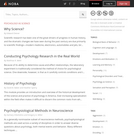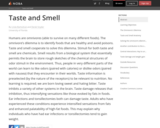
Noba is a high-quality, flexibly structured digital introduction to psychology resource for higher-ed classrooms and virtual classrooms. Noba consists of nearly 90 short (2500-4000 word) chapters authored by leading instructors and researchers including 7 winners of the William James Award. Chapters are organized in familiar categories (Development, Learning & Memory, Personality, etc.) for easy reference. All Noba materials are licensed through Creative Commons under the CC BY-NA-SA license terms.
The Noba website allows anyone to combine chapters in any order to create unique psychology textbooks to suit virtually any curriculum. In addition to allowing users to build their own customized collections, Noba provides a series of "Ready-Made" digital textbooks curated from the Noba chapters to conform to the scope and sequence of some of the most commonly taught 100/200-level psych courses (Intro-to-Psych, Psych as a Biological Science, Psych as a Social Science, etc.). The Ready-made books can also be edited to add or remove chapters, or sections so that they better conform to the specific course an instructor will teach.
Custom-made books, Ready-made books, or even individual chapters can be used online, downloaded as PDFs or shared withe learners via email and social media using easy-share tools built in to the website.
- Subject:
- Psychology
- Social Science
- Material Type:
- Reading
- Textbook
- Provider:
- Diener Education Fund
- Provider Set:
- Noba
- Author:
- David Barlow
- David Buss
- Ed Diener
- Elizabeth Loftus
- Henry Roediger
- Jeanne Tsai
- Linda Bartoshuk
- Max Bazerman
- Peter Salovey
- Robert Levine
- Roy Baumeister
- Susan Fiske
- Date Added:
- 03/27/2014
